SUMMARY
This is AI generated summarization, which may have errors. For context, always refer to the full article.
AT A GLANCE
- The government allotted a P6 billion budget for the country’s hosting of the 2019 Southeast Asian Games.
- Corruption allegations surfaced, with many criticisms directed to the P55 million spent to build a cauldron in the main venue in Capas, Tarlac.
- Amid controversies, the Philippines emerged as overall champion in the SEA Games behind a massive home crowd support.
- World champions and Tokyo Olympic qualifiers, led by gymnastics sensation Carlos Yulo and pole vault standout EJ Obiena, highlighted the Philippines’ 2019 campaign.
- To produce more world-class athletes, President Rodrigo Duterte signed into law Republic Act 11470, which will establish the National Academy of Sports.
Before the coronavirus pandemic put world sports at a standstill, the Philippines had a sports campaign to remember.
It was the best year yet in sports under President Rodrigo Duterte’s term as the Philippines emerged overall champion in the 2019 Southeast Asian Games and celebrated athletes who topped world championships and booked Tokyo Olympics spots.
But the glory also came with controversies, mainly during the country’s hosting of the SEA Games which was allotted a P6 billion budget.
Money-spinning
Compared to previous years, the Philippine Sports Commission (PSC) received a total of P6 billion from the government for the hosting of the 2019 Southeast Asian (SEA) Games.
Prior to 2019, the national budget has only been allocating an average of P204,304,000 to the PSC from the General Appropriations Act.
But due to the country’s hosting of the regional biennial meet, the PSC’s budget allocation from the government ballooned to over P5 billion.
However, that was not the original amount proposed by the Philippine SEA Games Organizing Committee (Phisgoc) led by House speaker Alan Peter Cayetano.
The Phisgoc chairman requested a total of P7.5 billion, but the amount was questioned by Senator Frank Drilon as the funds were lodged under the Department of Foregin Affairs, which Cayetano was heading at that time.
During the bicameral conference committee meeting, Congress reduced the amount to just P5 billion despite the executive order instructing all government agencies to assist in the preparations of the sporting event.
It was thanks to Duterte’s late approval of an additional P1 billion from the Office of the President’s contingency fund that the total budget was boosted to P6 billion.
Missing the mark
However, even the breakdown of the P6 billion budget was controversial as it did not translate to the “world-class” hosting that the Phisgoc promised.
Most of the outputs and services of the SEA Games were executed poorly with the late procurement of sports equipment, photo-finish venues, and logistical problems. The Games’ official logo and the mascot Pami also became the center of jokes and memes.
In July 2019, Duterte wanted to ax Phisgoc due to alleged corruption over questionable deals as a private entity.
The first major deal was the P69-million Asics sponsorship issue, which would cover the official uniforms for the athletes and coaches.
Majority of the board members of the Philippine Olympic Committee, which owns the SEA Games franchise in the Philippines, questioned the deal as the sports merchandise prices quoted were “unreasonably higher” than the market price. (LOOK: Team PH launches official uniform for 2019 SEA Games)
In October, Phisgoc got entangled in a legal controversy with global information technology company Atos, which filed for a temporary restraining order against the PSC and POC.
The company claimed that it won the bidding for the SEAGIS project, which is the information system service of the SEA Games, and even inked a memorandum of agreement with Phisgoc chairman Alan Peter Cayetano.
But the PSC held another public bidding for the project in August, even though Phisgoc had already asked Atos to commence work in early 2019 and incurred $3 million worth of expenses.
The 2019 SEA Games cauldron, though, drew the most flak as P55 million was spent putting up a structure that is equivalent to 50 classrooms according to Senator Frank Drilon.
Ten days before the regional biennial meet kicked off, Cayetano revealed that Phisgoc extended “financial assistance” of P1.5 billion to the PSC and POC, citing that the the two organizations were “overwhelmed” by government procedures.
This meant the amount did not undergo public bidding as it is exempted from the government procurement law.
Excluded from the budget for Phisgoc is the P11-billion deal between the Bases Conversion and Development Authority (BCDA) and Malaysian firm MTD Capital Berhad for New Clark City’s sport facilities which was questioned by the government’s corporate counsels. (READ: How BCDA’s multi-billion New Clark deal slipped through)
The Office of the Government Corporate Counsel (OGCC) flagged the return-of-investment and profit-sharing schemes of the deal, even though BCDA insisted that it’s advantageous to the government.
The OGCC further argued that the deal was not a joint venture agreement, but a build-transfer scheme, which should’ve been subjected to a public bidding. (READ: OGCC flagged non-bidding of BCDA’s New Clark sports facilities)
In the end, Duterte remained firm in his belief in Cayetano and cleared him of all corruption allegations.
Rough start
Even before the SEA Games officially opened, it already hit several bumps in the road.
As participating nations arrived in the country, some football teams were forced to wait for hours to be picked up at the airport and for their hotel accommodation to be settled.
The Myanmar men’s football team, for example, waited for almost an hour before a “small kind of bus” transported the players and coaching staff to their hotel. (READ: Football teams ‘move on’ from SEA Games arrival debacle)
Meanwhile, the Cambodian men’s football team had to stay in a hotel conference room for half a day since rooms were not ready.
To put it into perspective, P380 million was allocated for accommodation and P4.9 million for pregame transportation.
Fast forward to the men’s football tournament, the problems piled up as several parts of the Rizal Memorial Stadium were still either being renovated or constructed.
Organizers found themselves in hot water when a partially done hall – which looked like an old warehouse – served as a press conference room and media center.
Food also became an issue as Philippine women’s football team head coach Let Dimzon bared they were served kikiam for breakfast.
The hotel that accommodated the Philippine women’s football team denied the allegations and said Dimzon repeatedly apologized for her statement.
After that, the team captain of the Brunei men’s football team – who also happens to be the nephew of the Sultan – was rushed to the hospital after his allergy was triggered by a dish served in the hotel he was staying in.
These SEA Games mishaps were compared by netizens to that of the disastrous Fyre Festival, a supposedly lavish music festival in the Bahamas that ended up being a major flop.
Big hit
Criticism turned into praise as the Games officially came off the wraps with the grand opening ceremonies, where Filipino heritage and talent were in full display.
Even Duterte could not resist from enjoying the festivities as he jived to the tune of OPM classic Manila when the Philippine contingent took centerstage for the parade of athletes.
Buoyed by a massive home crowd support, the Philippines zoomed to the top of the medal tally with a whopping 23 gold medals in Day 1 thanks to dominant performances from dancesports, sepak takraw, and triathlon.
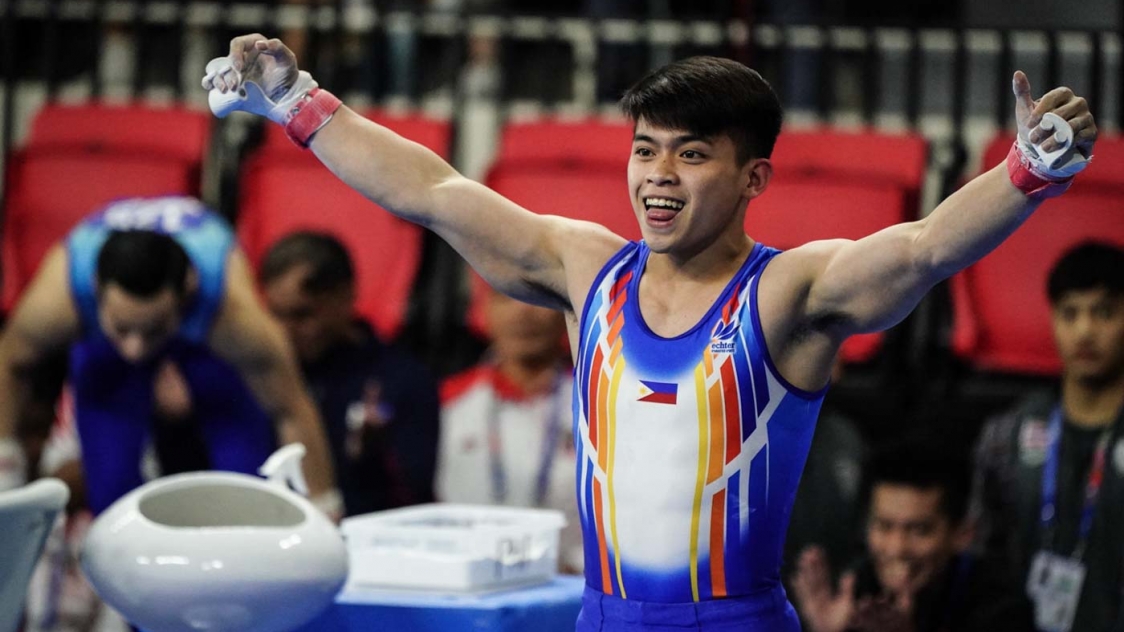
From start to finish, the Philippines raked in medals after medals en route to winning the SEA Games overall championship for the first time in 14 years with 149 gold, 117 silver, and 121 bronze medals.
Several Filipino athletes stood out during the SEA Games, among them Carlos Yulo (gymnastics), Roger Casogay (surfing), Agatha Wong (wushu), Hidilyn Diaz (weightlifting), and Ernest Obiena (pole vault).
Yulo emerged as the Philippines’ most bemedalled athlete with 2 gold and 5 silver medals, while Casogay touched the heart of Filipinos after helping his Indonesian foe get back to safety during their heat.
Wong bagged two gold medals and defended her 2017 SEA Games crown, while Diaz and Obiena both won their maiden SEA Games gold medals.
The country also excelled in events that either returned or debuted in the regional showpiece.
Arnis delivered 14 golds, obstacle course racing swept all 6 golds, 3×3 basketball won both golds in the men’s and women’s divisions, while esports clinched 3 out of the 5 golds up for grabs.
Aside from the SEA Games, Filipino athletes shone in other international tournaments.
Obiena became the first Filipino to qualify for the Tokyo Games, while Yulo also punched his Olympic ticket and captured the Philippines’ maiden gold medal in the world gymnastics championships.
Immediately after Yulo made history, another Filipino made the headlines as Nesthy Petecio won a gold medal in the world boxing championships.
And just before the coronavirus shut down sports worldwide, Eumir Marcial and Irish Magno joined Obiena and Yulo in the Philippines’ Tokyo Games roster after impressing in the Olympic qualifiers.
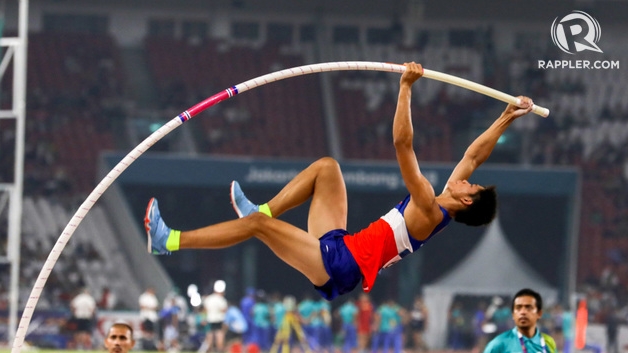
Yulo received a total of P3.25 million as he emerged as the most bemedalled athlete from the Philippines in the 2019 SEA Games off 2 golds and 5 silver medals.
Duterte promised P250,000 for a gold medal, P150,000 for a silver and P100,000 for a bronze on top of the incentive system of the Philippine Sports Commission Act (RA 10699) and the Philippine Olympic Committee’s P200,000 bonus for gold medalists, which makes each SEA Games gold worth P750,000.
The PSC Act awards P300,000 for a gold, P150,000 for a silver and P60,000 for a bronze in the regional meet.
Heartbreaks
While Yulo delivered for the Philippines in the SEA Games, Gymnastics Association of the Philippines president Cynthia Carrion lamented he could have won more gold medals had he not been distracted.
As Yulo saw action in the country for the first time since his world championship triumph, fans and media left and right tried to get a piece of him.
The distraction, Carrion felt, prevented Yulo from pulling off a gold-medal sweep of his events.
Another athlete who represented the Philippines well in the SEA Games was Wong, but she still faced criticism following her victories.
Wong had to clarify she is a “Filipina more than anything” after reading comments suggesting she only ruled the wushu competition because she is part Chinese.
Over in karate, Junna Tsukii claimed she was “bullied” by national team head coach Okay Arpa despite bagging a SEA Games gold medal.
Tsukii said Arpa, who hails from Turkey, told her she was “dead” to him – an incident that prompted a probe by the Philippine Sports Commission and the Karate Pilipinas Inc.
Although it managed to reassert its dominance in the region with another SEA Games gold medal, Gilas Pilipinas struggled against significantly stronger opponents in the FIBA World Cup.
In 5 World Cup games, Gilas Pilipinas never won and lost by a combined 147 points to finish dead last in the 32-nation tournament.
With Duterte in the stands in China, Gilas Pilipinas suffered a 46-point beating from Italy in its tournament opener before it endured excruciating losses to Serbia, Angola, Tunisia, and Iran.
Following the success of the athletes in the 2019 Southeast Asian Games, the Philippines was set to host the ASEAN Para Games in January.
However, the PSC rescheduled the staging of the biennial meet for differently-abled athletes to March, citing the lack of funds and logistical constraints.
But with the onset of the coronavirus pandemic, the Para Games was eventually canceled.
The pandemic has also affected the promise of PSC chairman Butch Ramirez to increase the salaries of local Class A coaches from US$1,200 to US$2,000 and provide them with more training through the Philippine Sports Institute.
With a fund cut from its main backer, the Philippine Amusement and Gaming Corporation (Pagcor), PSC is forced to slash the allowances of athletes and salaries of coaches by 50%.
With the postponement of the Tokyo 2020 Olympics, the P100 million budget committed by Duterte for the country’s Olympic preparations were reallocated to the coronavirus relief efforts.
The Philippines targets 36 more Olympians to join Obiena, Yulo, Marcial and Magno in the country’s delegation in the global sports showpiece.
New goals
To better groom Filipino athletes of the future, Duterte signed into law Republic Act 11470, which will establish the National Academy of Sports (NAS).
Promising athletes who want to pursue a career in sports will be recruited and given a full scholarship ride for a secondary education program that will be integrated with a special curriculum in sports.
The main campus of the NAS will be built at the New Clark City Sports Center in Capas, Tarlac as the enrolled student-athletes train and study in facilities that should be at par with international standards.
As long as they have the potential, qualified student-athletes are welcome in the NAS, including indigenous peoples, persons with disabilities, and those who come from other marginalized groups.
Eventually, the NAS system is planned to expand with satellite branches and regional campuses. – Rappler.com
Add a comment
How does this make you feel?
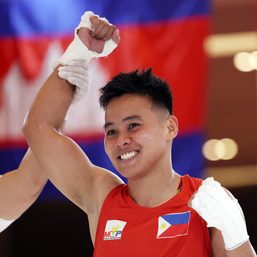
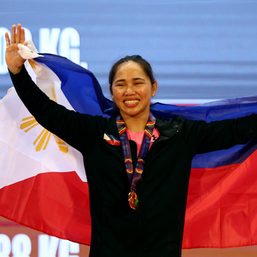
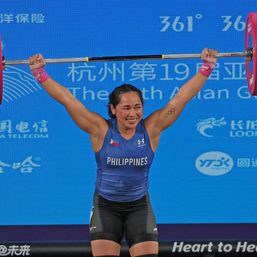
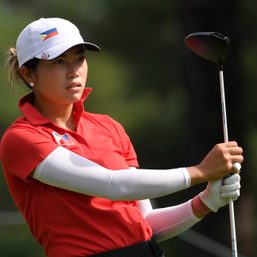
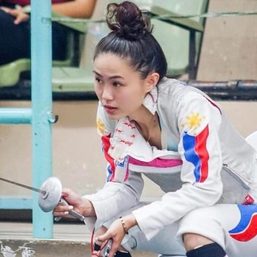
There are no comments yet. Add your comment to start the conversation.